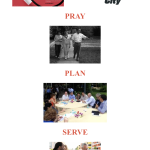 You’re saying, “Duh.” Yes, I knew that business as missions was a hot topic. But I had no idea just *how* hot until this past weekend when I called in favors from 3 co-workers in Team Expansion to help me lead a workshop on the topic at a major missions mobilization event in Tulsa, OK at the downtown convention center there. I had fully prepared myself for the possibility that, in the end, there might be more teachers than students. To my absolute surprise, well over 300 participants jammed into the standing-only crowd. My panelists did a great job — one having worked for 5 years as a business training consultant in a certain communist land with over 1 billion people, another having worked for 5 years designing services that benefit tourists in a North African land, and the final having worked for 7 years serving in a Southeast Asian land with an agricultural spin-off. We talked about all the obligatory topics: definitions, principles, options for getting started, overcoming hurdles, interfacing with governments, and more — the whole nine yards. But it was when we opened it up for questions for the last 25 minutes that I really saw the hunger. Many of those 300 folks were so eager to pick the brains of my panelists that when I would finally call on them, some would pump their firsts and whisper, “Yes!” then proceed to ask their question. And they were great questions, too, showing that they had traveled well, processed their input, and dreamed of the future.
You’re saying, “Duh.” Yes, I knew that business as missions was a hot topic. But I had no idea just *how* hot until this past weekend when I called in favors from 3 co-workers in Team Expansion to help me lead a workshop on the topic at a major missions mobilization event in Tulsa, OK at the downtown convention center there. I had fully prepared myself for the possibility that, in the end, there might be more teachers than students. To my absolute surprise, well over 300 participants jammed into the standing-only crowd. My panelists did a great job — one having worked for 5 years as a business training consultant in a certain communist land with over 1 billion people, another having worked for 5 years designing services that benefit tourists in a North African land, and the final having worked for 7 years serving in a Southeast Asian land with an agricultural spin-off. We talked about all the obligatory topics: definitions, principles, options for getting started, overcoming hurdles, interfacing with governments, and more — the whole nine yards. But it was when we opened it up for questions for the last 25 minutes that I really saw the hunger. Many of those 300 folks were so eager to pick the brains of my panelists that when I would finally call on them, some would pump their firsts and whisper, “Yes!” then proceed to ask their question. And they were great questions, too, showing that they had traveled well, processed their input, and dreamed of the future.
Maybe this “BAM” thing is so hot because today’s twenty-something’s are eager to grasp the latest fad. But as for me, I think not. I think there are some concrete reasons. First, they’re all so concerned about ministry among the poor. Launching a BAM ministry seems somehow more noble to them than “mere” preaching & teaching Christ. Second, I believe the interest in unreached peoples has finally hit stride. They realize that they’ll *need* BAM to get into most of these least-reached locations. Third, it almost seems that today’s twenty-something’s have come to value more highly the *concrete* and tangible outputs of a BAM ministry. Let’s face it — many would say the days of going door-to-door with a correspondence course (like I did in Uruguay in 1982) has long-since passed. Today’s students want to solve felt-need community problems, like obtaining fresh water supplies, setting up community health outreaches, and launching farms.
Are you discovering similar (or contrasting) principles? What are *you* noticing as you travel and speak. And, if you’ve been involved (or are right now) in these sorts of outreaches, are you seeing it too? What benefits do you see to embracing Business as Missions for your project? What pitfalls are you seeing? Would you write a brief testimony (in as broad a’ terms as possible)
And what resources are you finding for B.A.M. For example, do these help?
http://www.tentmakernet.com/ — where you can download a free PDF copy of “Working Your Way to the Nations”, a 208-page treasure-trove of tentmaking & business as missions principles and practical helps
http://www.globalopps.org/books/index.htm — where you can see a complete book list of helps
http://www.businessasmission.com/pages/books — more of the above
http://www.businessasmissionnetwork.com/2007/07/ — to find a top-25 book list for BAM
http://www.godisatwork.org/ — modeled after the well-known book by the same name
To what other resource lists and options would you direct learners?
Please click “Comment” below to add your resources and notes.












Several of those who attended your workshop were students from our college. This gives me an opportunity to discover some of the reasons that they are so interested in BAM.
1) Yes, you are correct: they are interested in the latest “fads.”
2) Yes, you are correct again: they are more interested in concrete service than in door-to-door “sales.” But those are not the only two options, are they. I would not want to return to a generation that offered a lot of preaching with little compassionate service, but neither would I want to default to the social gospel attitude where the physical is all that matters. I fear that while mission leaders are committed to spreading the gospel through their platform businesses, many younger recruits are moved only by a desire to make a difference among poor people, with little awareness of their spiritual needs. Will the next generation criticize this one for exporting Western business culture and materialism rather than the gospel of Christ, as we criticized past missionaries? Only time will tell; but the more we raise awareness of this danger, the more hope there is that we will not make that mistake.
3) Another great draw for BAM is the mistaken notion that it will cover financial needs so that new recruits will not have to rely on raising support from churches. This attitude is full of misconceptions, but I find it to be strong among today’s youth. I fear the consequences of churches being founded and led by missionaries who have never experience healthy church life themselves and who are carrying on their ministries independent from strong ties to and support from sending congregations.
Hi Mark. It’s great that you refer to our workshop… and, interestingly enough, I think we dealt *directly* with both your concerns.
a) B.A.M. might actually end up costing you *more* money than the one-time outgoing funds that so many missionaries have to raise today. One of our three panelists had to raise $100,000 just to start his business (by law in the destination country). I think they got that message loud and clear.
b) We talked a *lot* about the need to remain focused and intentional with the *message*. For example, in one example, we referred to a BAM effort that relied on, as its national supervisor, a member of a cult. We demonstrated how hollow that effort would be.
So … grave concerns… and I hope we referenced them.
I disagree with Mark H, and I don’t know which college you’re from, but I think that while there are some who fall into your categories, most BAM practitioners or soon-to-be practioners have a much more healthy, balanced understanding of what BAM will provide and have biblical, balanced motives as well. It’s true that undergrad-level students who have only an introductory-level understanding of BAM often will find themselves holding a poorly analyzed, extreme point-of-view, and they will not have considered different aspects of BAM. Please don’t believe that most BAM proponents have the same understanding as these BAM 101 folks, though. Undergrad-level students tend to be this way with just about every subject, and hopefully they will have matured a bit by the time they matriculate. There is so much rich information out there about BAM, and it would be wise to steer the poorly informed towards good resources. This Brigada article links to several sites with tons of literature, and I’m sure that Doug Lucas (or someone else he designates) would love to interact with people interested in getting a well-balanced understanding of BAM. I know that I would love to do that as well, so you can send people my way too. I didn’t get to attend the workshop at the convention, but I’m planning on getting the audio record of it, and I’m going to be doing BAM in Asia soon.
Sorry your event was crawl’n with “college kids.” As a former college kid I don’t think you have a firm understanding of the younger generation. A fad is something that comes and goes as the wanderlust pop-culture deems. Business as Mission has always been around and looks to be around into the distant future. The old concept simply has a new name and a Web 2.0 spin to it. BAM is evolving (in a micro sense) as the culture morphs. If you had a better understanding of the modern culture you might have a better understanding of how it packages concepts.
Claiming that BAM partitioners are exporting capitalist greed is to misunderstand the elective nature of free markets to prop up what populations actually want. If a market doesn’t want it no-one’s going to be selling it long. The traditional support model, on the other hand, is a supply side model that is setup to meet the needs of the sending culture instead of the receiving population. This traditional model has a long history of exporting a western culture and forgetting to unpack the gospel of its cultural baggage.
Brad, sorry — I’m traveling overseas in the Middle East so shouldn’t take long… but just wanted to let you know that I think you might have misunderstood… or better said, maybe I didn’t state myself clearly enough. I wasn’t at all implying that the college students were at all a problem. In fact, as I read your post, I can’t help but note that practically every sentence seems aimed at something that neither I, nor any other commenter, has mentioned.
*** We’re *glad* there were plenty of students there. The fields are calling for them!
*** We’re working hard to try to understand all generations. We need all ages if we’re going to do “BAM” correctly. Your help is greatly appreciated — but please don’t imply that we aren’t former students ourselves. (Some of us still are, in fact.)
*** Didn’t mean to imply that BAM is a fad. I’ve taught workshops on “tentmaking” as far back as 1985. There would be 12 or 13 participants in the room. I was just struck by the fact that, in this workshop — same event – there were *hundreds*. Call it a freak accident, but I’d rather think that there is a huge surge of interest in BAM — for whatever reason. I’m not a demographer. So I can’t answer that one.
*** As for your sentence, “If you had a better understanding of the modern culture you might have a better understanding of how it packages concepts,” my only request would be — if possible, please try to keep these comments focused on tangible resources, rather than … whatever that sentence was.
*** I just read through the comments and… maybe it’s because I’m in a smoky internet cafe in a middle eastern city where everybody still smokes these pipe things in the water, you know? … and maybe I’m just fogged over, but I don’t really see Mark’s question as being anything more than a hypothetical pondering. So again, please try to keep things positive here in Brigada comments. If you decide to rebuke, please do so gently. :-)
That’s probably enough for now. I think the wireless signal just dropped — again. :-(
Doug Lucas
Brigada Founder/Editor